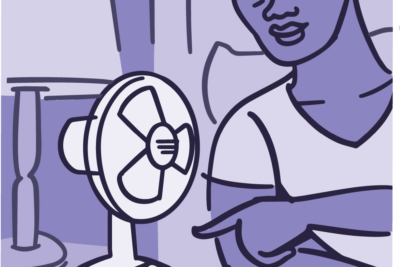
Some Opioid Addictions Begin in the Hospital - Walter Bradley Center for Natural and Artificial Intelligence

In a recent podcast, “A first-hand account of kicking Fentanyl addiction: reversing Hebb’s law” (May 12, 2022), Walter Bradley Center director Robert J. Marks interviews a man who got addicted to Fentanyl as a medical drug.
“Stretch”
tells us how he got hooked and how he finally beat the narcotic,
without once going to the street for help, though his experience was
challenging, to say the least. Readers may also wish to read or hear
anesthesiologist Richard Hurley’s perspective here and here.
Before we get started: Note:
Robert J. Marks, a Distinguished Professor of Computer and Electrical
Engineering, Engineering at Baylor University, has a new book, coming
out Non-Computable You (June, 2022), on the need for realism in another area as well — the capabilities of artificial intelligence. Stay tuned.
This portion begins at approximately 01:00 min. A partial transcript and notes, Show Notes, and Additional Resources follow.
Robert J. Marks: Donald Hebb
(1904–1985) is considered the father of neuropsychology because he
first effectively merged the psychological world and the world of
neuroscience. He is known for Hebb’s Law. We study it in artificial intelligence — and it’s part of brain chemistry.
Hebb’s Law says that, neurons that fire together, wire together.
In terms of addiction … the path between the neurons dedicated to the
action and the neurons dedicated to the pleasure build up in strength.
So the path becomes stronger and stronger. Triggers eventually push you
towards performing the action to experience the pleasure…
Our guest
today was addicted to opioids, specifically the highly potent synthetic
opioid, Fentanyl. And we’re not going to disclose his identity; we’ll
simply call him Stretch.
Well, first of all, Stretch, et’s get
legality out of the way. You never purchased fentanyl off the street. I
think all of the drugs that you became addicted to were prescribed by
physicians. Is this right?
Stretch: Yep.
Robert J. Marks:
And I do know that you suffered from a series of failed surgeries.
Let’s talk about these. Could you kind of go through the surgeries and
the pain associated with each one, and then the corresponding opioid
prescriptions you were given?
Stretch: I got diagnosed with
inflammatory bowel disease; this was 1999. It was after a long period of
bleeding, basically bloody diarrhea continuously. And urgent. Urgent.
But it was always lots of blood.
Before I ended up at the
gastroenterologist, my general practitioner kept diagnosing me with
hemorrhoids. In reality, the failings of the medical community started
with the late diagnosis of this disease … before my general practitioner
walked through the insurance-approved steps to get me a proper
diagnosis. And initially, the inflammation was seen with a barium enema,
which is a horrible experience. You don’t want to be in front of a
doctor who is standing behind a sheet of Plexiglas to assess you. That’s
never a good situation.
Robert J. Marks: Wait, wait, there was a Plexiglas between you and the doctor?
Stretch:
Yes, because I had received a barium enema for the imaging. And when he
came in, he wanted to protect himself in case the barium let loose …
So
he stood behind it like a Roman shield that he carried with him. It was
Plexiglas that he could see through… Anyhow, I finally saw a
gastroenterologist. He did an endoscopy. Yes, there was evidence of ulcerative colitis … Crohn’s disease
is basically the same inflammatory bowel disease, but it affects the
whole digestive tract, where ulcerative colitis is strictly colon and
rectum.
So I went on medication. That was difficult, trying to hold
an enema of medication when you go to bed every night. So I was glad
that my disease went into remission.
At the time, I didn’t understand
the significance of the medication … So after the medication worked, I
stopped taking it, thinking, oh, goody, that’s over with! Well, it came
back with a vengeance and the medication never worked again So I ended
up in the local hospital, for a week. They couldn’t bring the
inflammation under control with prednisone.
That was the place I received my first injection of opiates, about the fourth day I was in there.
The
nurse instigated the shot. I think she understood I was pretty
miserable and offered me one where nobody else had. And of course I was
kind of like, “I guess.” And she’s, “Okay I’m going to get you one.” So
she comes back with a shot and gives it to me.
And it seemed like
forever later, just sitting on the edge of the bed in the same exact
spot that I was, after I sat up after she gave me the injection. It just
kind of totally zoned me out.
It zoned me out, but it was an escape
from the reality of my situation at the time, even though I didn’t
understand it as such. I just zoned out. So it kind of gave me a mental
and physical respite that I probably didn’t even recognize that I was
getting at the time.
But it wasn’t a sense of “I want that again” or
“Oh, I need to have that.” I just noticed something strange happening
with the passing of time over this period. I realized I was loopy. But
the notion that all this time had passed and I couldn’t recall being
miserable during that period was interesting.
I ended up going to the Cleveland Clinic.
Robert J. Marks: Now, the Cleveland Clinic has an incredible reputation.
Stretch:
Yes. At the time they were one of the best, probably next to Mayo
Clinic, the next best place to go in the country for bowel surgery,
colorectal surgery. And there was a gentleman from Australia there, Dr.
Fazio, who had developed a fine program that they were proud of and that
drew a lot of support. So off I went, transferred at night in an
ambulette [a wheelchair delivery van].
Robert J. Marks: Okay. So you went to the Cleveland Clinic and you had an operation.
Stretch:
I ended up having an emergency colectomy. It was kind of taken out of
my hands. The surgeon said, “You’ve got to do this, or it could rupture
and you might die.”
(In the operation, the surgeon removed Stretch’s entire large intestine, leaving him with an ileostomy for the remaining small intestine. It was the first of three surgeries.)
Robert J. Marks: Okay. Now, when you did this, again, that was clearly a lot of pain, and there were probably more opioids.
Stretch:
Yes. And interestingly, at the time, of course, I had pain medicine for
the surgery and after. My pain was bad, but it wasn’t excruciating.
They gave me opiates until it was time to go home. They gave me a modest
amount of opiates. I believe they actually had tapered me off the
opiates before they let me leave the hospital.
Robert J. Marks: Dr. Hurley, when I was talking to him, said that during surgery, he pumps enough Fentanyl into patients
to kill them. But they’re in the operating room and so, the breathing
apparatus takes over. So you went through an experience like that, I
suppose.
Stretch: Yeah. And you wake up in the recovery room
and the nurse would assess your pain, if I recall. I’m awful groggy and
they would administer more if you needed it, kind of assess based on
your feedback.
Robert J. Marks: Did they give you one of these little push buttons? …
Stretch:
I do believe I had a pump with a button. It’s self-initiated, but it
won’t give you any more medication than the doctor has told it, it can
give you.
But the important thing there was, is when I checked out,
they were very adamant to me about not using opiates, unless I
absolutely has to. It was Percocet
at the time, common just everyday Percocet. They were very direct:
“Don’t use this if you don’t need to.” And I didn’t feel like I needed
to. And I heeded the warning so I used ibuprofen.
Robert J. Marks: Not an opiate.
Stretch:
For the most part, I used ibuprofen. After I was home, there were a
couple nights where I chose to take some of the opiates and I hated the
way it made me feel. I mean, it bothered me. I couldn’t sleep and things
were irritating. So I was deterred from taking it…
Robert J. Marks: Okay. Would you say you were in any way addicted?
Stretch:
Interestingly, I didn’t know it at the time. But after having been on
them in the hospital and come home, I was really having a hard time
sleeping. I was fidgety and my arms would ache and it’s like, what is
going on? And after I ended up dependent and addicted, I understood what
was happening at that time. And I actually ended up calling, I was so
disturbed, I called one of the doctors at the Cleveland Clinics, “What’s
going on?” From the withdrawal effects that I didn’t understand that I
was experiencing, I was experiencing them as just like a panic
psychological problem.
Robert J. Marks: You did have withdrawal symptoms, but you really didn’t identify them with the opioids.
Stretch: Yeah, I didn’t know that’s what it was.
Next: After the second surgery, Stretch got even more friendly with opioids.
You may also wish to read:
Opioids: The high is brief, the death toll is ghastly.
Fentanyl has medical uses in, say, open heart operations where the
patient is on life support; otherwise, it is a one-way ticket off the
planet. Anesthesiologist Richard Hurley tells Robert J. Marks how
Fentanyl affects the brain and why the street version is so deadly.
and
What anti-opioid strategies could really lower
the death toll? Anesthetist Dr. Richard Hurley discussed with Robert J.
Marks the value of cognitive behavior therapy — reframing the problem.
Life expectancy in the United States is decreasing due to opioid deaths,
though the problem is now primarily street drugs, not medically
prescribed ones.
Podcast Transcript Download
Mind Matters
features original news and analysis at the intersection of artificial
and natural intelligence. Through articles and podcasts, it explores
issues, challenges, and controversies relating to human and artificial
intelligence from a perspective that values the unique capabilities of
human beings. Mind Matters is published by the Walter Bradley Center for Natural and Artificial Intelligence.




Entradas Relacionadas